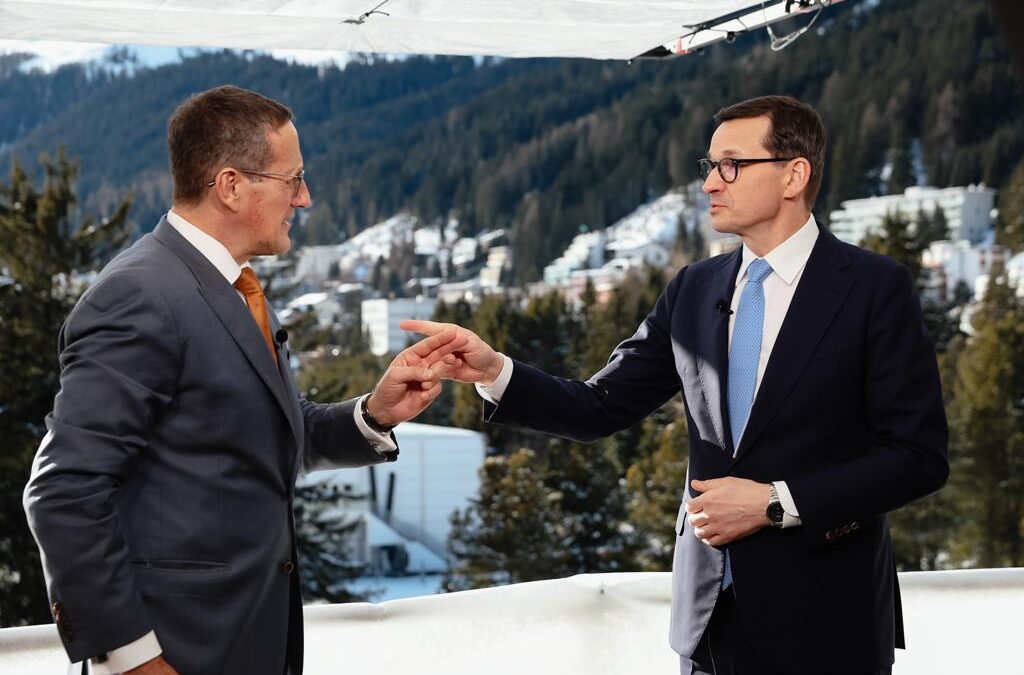Poland’s prime minister has called on German politicians to end their “procrastination” over providing support to Ukraine. They need to stop living in “previous era” and “reinvent themselves”, he says.
Mateusz Morawiecki’s remarks came at the World Economic Forum in Davos during an interview with CNN in which he also argued that Poland’s economy is better placed than western ones to weather the current crisis and expressed “cautious optimism” that a judicial bill intended to unlock frozen EU funds will be adopted.
"My mind is occupied with the events in Ukraine all the time."
Polish Prime Minister Mateusz Morawiecki talks Ukraine as President Zelensky addresses Davos. pic.twitter.com/LfelfCTOCB
— Quest Means Business (@questCNN) January 18, 2023
The prime minister was asked about his government’s intention to transfer some of its Leopard tanks to Ukraine in order to support its neighbour’s defence against Russia’s invasion. Doing so would require permission from Germany, where the tanks are manufactured.
Morawiecki noted that his government has been attempting to “encourage and inspire others, in particular the Germans”, to support a broader plan to send heavy, modern military equipment to Kyiv. But “unfortunately they [Germany] procrastinate on many different issues related to Ukraine”.
“Unfortunately I believe that many German politicians are still embedded in the previous era,” he continued, noting that Germany had “put all its eggs in one basket, called Russian gas”, and now this basket is now “not exactly in good shape”.
“Now they have to reinvent themselves,” said Morawiecki. “This is why probably they are hesitating and procrastinating and not supportive for Ukraine.”
For more on Poland's plans to give Ukraine some of its Leopard tanks – which would require permission from Germany, where they were manufactured – see our report from Monday https://t.co/HhsM3kkKbl
— Notes from Poland 🇵🇱 (@notesfrompoland) January 11, 2023
Poland’s government has long criticised Germany’s reliance on Russian energy. Since the invasion of Ukraine, it has also regularly chided Berlin for not doing enough to support Kyiv.
According to figures compiled by the Kiel Institute in its Ukraine Support Tracker, in absolute terms Germany was the third biggest donor country to Ukraine last year when it comes to all form of aid, and also the third biggest donor of military equipment. Poland was fifth and fourth in those rankings.
However, in relation to the size of countries’ economies, Germany was only the 17th biggest donor. Poland was third, behind only Estonia and Latvia.
CNN’s Richard Quest also noted that the Polish government is facing difficulties in pushing through a bill intended to overhaul its disciplinary system for judges. The legislation is intended to meet EU demands in order to unlock billions of euros in funds frozen over rule-of-law concerns.
While the main ruling Law and Justice (PiS) party has supported the bill, its hardline junior coalition partner United Poland (Solidarna Polska), led by the justice minister, is opposed to it while opposition parties have called for major changes to be made to the legislation.
Meanwhile, President Andrzej Duda – normally a PiS ally – has expressed doubts about the proposed law, leading to speculation that he could veto it.
While acknowledging that “it is the president’s prerogative” as to whether he would sign the law, Morawiecki told CNN that he was “cautiously optimistic” it would pass.
When asked about the prospect of Poland going into recession just as the government seeks an unprecedented third term at parliamentary elections this autumn, Morawiecki told Quest that someone must have given him the “wrong notes”.
“Our economy is in very good shape,” said the prime minister, pointing to 4.5-5% GDP growth last year and forecast 1-2% growth in 2023. “I know Germany’s going to go into recession, probably Italy, maybe the United Kingdom, but not Poland,” he added.
In November, Poland’s central bank forecast that GDP would grow 4.6% in 2022 and 0.7% in 2023. The same month, the European Commission published forecasts of 4% and 0.7% respectively for those years for Poland. In December, however, the Polish government claimed that growth would reach 1.5% in 2023.
Main image credit: Mateusz Morawiecki/Facebook

Daniel Tilles is editor-in-chief of Notes from Poland. He has written on Polish affairs for a wide range of publications, including Foreign Policy, POLITICO Europe, EUobserver and Dziennik Gazeta Prawna.




















